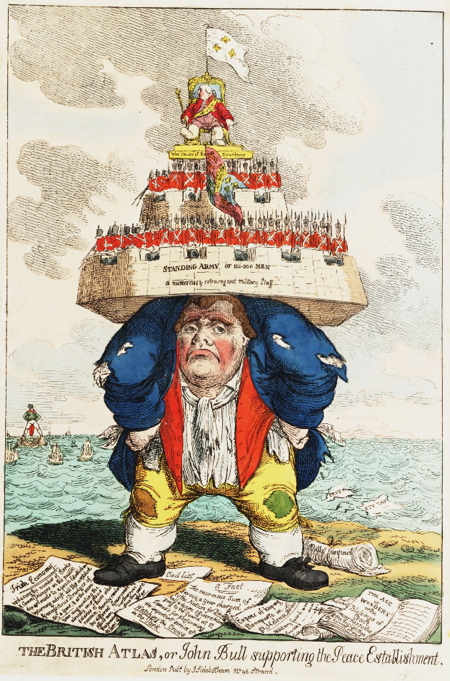
Histories of the discipline of sociology usually give short shrift to the classical liberal tradition.1 Sometimes Alexis de Tocqueville gets a mention; Herbert Spencer is dismissed as an anachronism who is barely worth reading anymore; some technical aspects of Pareto’s thought is readily discussed but his “fascist” turn in the 1920s is a cause for worry and a reason to dismiss much of the rest of his work; and of course Max Weber is seen as a pivotal figure in the development of the modern discipline.
However, most of the space in these histories (including dictionaries and encyclopedias like those by Blackwell, Princeton, and Routledge) is devoted to socialist and other statist-inspired authors whose intellectual lineage goes back to Auguste Comte and Karl Marx. This is to get everything backwards in my view, as these “socialist sociologists” came after a lot of significant work in establishing the foundations of the disciple were laid by “liberal sociologists”. I have tried to show this alternative lineage in my anthology of classical liberal class analysis (CLCA) entitled “Plunderers, Parasites, and Plutocrats: An Anthology of Classical Liberal Writing on Class Analysis from Boétie to Buchanan” and in a monograph, a shortened version of which is destined to appeared as a chapter on “Class” for the Routledge Companion to Libertarianism ed. Matt Zwolinski (forthcoming). In that work I sketch out a distinguished line of thinkers stretching back to the Levellers in the 1640s who should be included in any good history of sociological analysis, especially one that is interested in the emergence of institutions like private property, voluntary association, trade between individuals, the emergence of markets and other complex economic institutions, the emergence of the state, slavery and serfdom and others forms of exploitation, war, and so on.
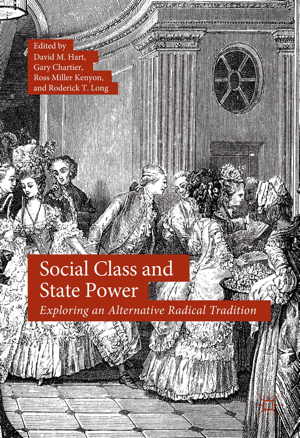
The sticking point for the mainstream approach to the study of sociology is that they cannot get the idea into their heads that voluntary market relations, especially the payment of wages, are NOT necessarily an exploitative relationship, as well as the idea that every action of the state and its officers IS coercive in nature and this has a profound impact on the way people think, behave, and organise themselves.
I have endeavored to rectify this situation by putting online in HTML and facs. PDF formats some of the best work to be found in this classical liberal sociology so it can act as a counterweight to this massive disproportion in the traditional literature. Over the past few months I have worked on the following individuals, especially the “three greats” – Gustave de Molinari, Herbert Spencer, and William Graham Sumner.
A Survey of the Some CL Sociologists who wrote on Class Analysis
See my draft of a monograph on “Libertarian Class Analysis: An Historical Survey” (Sept. 2020) and a shorter version of this “An Introduction to Classical Liberal/Libertarian Class Analysis” ( Oct. 2020). Also the anthology I helped put together on “the alternative tradition” of thinking about class: Social Class and State Power: Exploring an Alternative Radical Tradition, ed. David M. Hart, Gary Chartier, Ross Miller Kenyon, and Roderick T. Long (Palgrave Macmillan, 2018).
Jeremy Bentham (1748-1832), James Mill (1777-1836) and “the sinister interests”
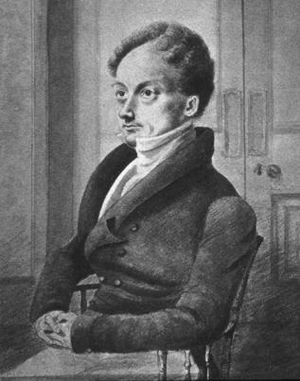
[James Mill (1770-1836)]
Jermey Bentham and James Mill were pioneering early 19th century political sociologists with their analysis of the “sinister interests” who ran the state for their own private benefit and not that of the “general interest.
See my short discussion of “James Mill and Jeremy Bentham on Class” and an anthology of James Mill’s writings on politics “The Political Writings of James Mill: Essays and Reviews on Politics and Society, 1815-1836”.
Charles Comte (1782-1837) and Charles Dunoyer (1786-1862) on the evolution of law, property, markets, and “industrial” societies
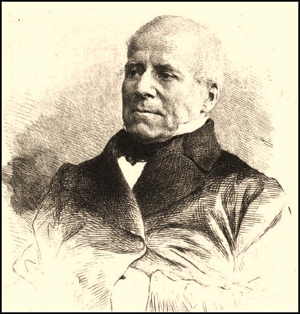
[Charles Dunoyer (1786-1862)]
Except for a very few historians and sociologists (the most notable being the Canadian sociologist Robert Leroux) the work of Comte and Dunoyer have been largely forgotten in spite of the great work they did in the late Empire and early Restoration period. I began gathering some of their most interesting essays which they published into journals, Le Censeur (1814-1815) and Le Censeur européen (1817-1819) as part of my bicentennial celebrations of the work. They wrote on the impact of war on economic and political development, the emergence of a new class of productive workers they called “les industrieux”, the nature of dictatorships, and a theory of historical development which they called the “industrial theory of history”.
A future project is to put online their most important work in HTML. It is a scandal that none of their work has been republished in French, let alone translated into English.
Editor’s note: I wrote my PhD on them several decades ago.
I have all their work online but only in facs. PDF format:
- Bibliography of Charles Comte and his major works: Traité de législation, ou exposition des lois générales suivant lesquelles les peuples prospèrent, dépérissent ou restent stationnaire (1827) 4 vols, and Traité de la propriété, 2 vols. (1834).
- Bibliography of Charles Dunoyer and his major sociological writings: L’Industrie et la morale considérées dans leurs rapports avec la liberté (1825), Nouveau traité d’économie sociale, ou simple exposition des causes sous l’influence desquelles les hommes parviennent à user de leurs forces avec le plus de LIBERTÉ, c’est-à-dire avec le plus FACILITÉ et de PUISSANCE (1830), 2 vols., and De la liberté du travail, ou simple exposé des conditions dans lesquelles les force humaines s’exercent avec le plus de puissance (1845), 3 vols.
Apart from myself, the following people have written extensively on Comte and Dunoyer:
Two major articles by Éphraïm Harpaz in the 1950s and 1960s, “Le Censeur, Histoire d’un journal libéral,” Revue des sciences humaines (1958) and “Le Censeur européen: histoire d’un journal quotidien,” Revue des sciences humaines (1964), which have been republished as Éphraïm Harpaz, Le Censeur. Le Censeur européen. Histoire d’un Journal libéral et industrialiste (Genève: Slatkine Reprints, 2000).
The other author of note is Robert Leroux, Aux fondements de l’industrialisme : Comte, Dunoyer et la pensée libérale en France (Paris: Editions Hermann, 2015).
Gustave de Molinari (1819-1912) on Political and Economic Evolution
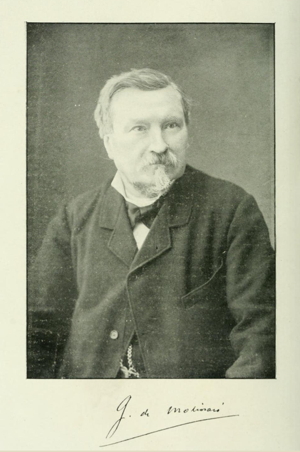
[Gustave de Molinari (1819-1912)]
The Belgian/French political economist Gustave de Molinari is one of the great forgotten CL sociologists of the 19th century. As a young man he wrote some pioneering essays for the Dictionnaire de l’économie politique (1852-53), some 30 in French only 7 of which have been translated into English.
Soon after this he wrote a work in order to explore how Louis Napoleon came to be “Emperor” of a republic. His class analysis in this work was based on the idea of the conflict between the “tax-payers” and the “tax-eaters” and the new coalition formed between traditional ruling elites in the military and the church, the rising economic elites among the state and subsidized and protected agricultural and manufacturing industries, and the bureaucrats who ran the government agencies which regulated the economy: Les Révolutions et le despotisme envisagés au point de vue des intérêts matériels (Revolutions and Despotism seen from the perspective of material interests)(1852) – text.
Towards the end of his long life, after a couple of decades as an economic journalist for the Journal des débuts, he wrote a trilogy of great sociological works exploring economic and political evolution, and the impact of the French revolution and war on these evolutionary process: L’évolution économique du XIXe siècle: théorie du progrès (Economic Evolution in the 19th Century: A Theory of Progress) (1880) text, L’évolution politique et la révolution (Political Evolution and the Revolution) (1884) text; Grandeur et decadence de la guerre (The Rise and Fall of War) (1898) text.
He then wrote a final fourth volume which summarised his life’s work on this topic: Économie de l’histoire: Théorie de l’Évolution (The Economics of History: A Theory of Evolution) (1908) text.
It is scandalous that only one of these works has been republished – Grandeur et decadence de la guerre (The Rise and Fall of War) (1898 – by the Institute Coppet, and none translated into English.
Herbert Spencer (1820-1903) and the evolution of “industrial” and militant” types of society
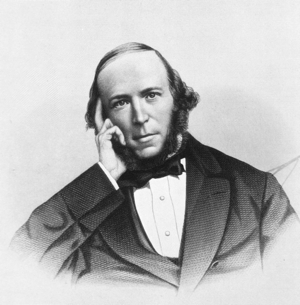
[Herbert Spencer (1820-1903)]
The work of the English radical individualist is well known but not well understood. I have put online his major work on sociology The Principles of Sociology (1874-1896): vol.1; vol.2; vol.3; with a combined table of contents of the set to help researchers more easily explore his work.
William Graham Sumner (1840-1910) on Forgotten Men and Women, and Plutocrats
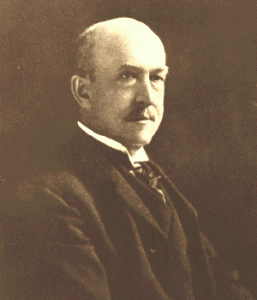
[William Graham Sumner (1840-1910)]
England had Herbert Spencer (1820-1903); France had Gustave de Molinari (1819-1912); and America had William Graham Sumner (1840-1910). All three did pioneering work in the emerging discipline of “sociology”, were radical classical liberals (libertarians), and were active in popularizing their ideas via journalism. Sumner was a professor of sociology at Yale University who wrote on free trade and protection, sound money and banking, and was an outspoken member of the American Anti-Imperialist League.
His work on classical liberal class analysis should also be mentioned, where he championed the interests of “The Forgotten Man and Woman” who paid the taxes which made it possible for the various vested interest groups, both large (plutocrats and party bosses) and small (those who sought government jobs), to enjoy their privileged position. Sumner also wrote several works against the theory and practice of socialism. In his view the great clash of the future would be between socialists from below and plutocrats from above, with the “forgotten” man and woman caught in the middle. I have put online the four volumes of his collected essays, his major treatise on sociology, Folkways (1906), and several other works:
- What Social Classes owe to Each Other (1883)
- Folkways: A Study of the Sociological Importance of Usages, Manners, Customs, Mores, and Morals (1906)
- Earth Hunger and Other Essays (1913)
- The Challenge of Facts and Other Essays (1914)
- The Forgotten Man and Other Essays (1918)
- War and Other Essays (1919)
- See for example the massive and comprehensive (weighing in at 5 vols. and over 5,000 pages) The Blackwell Encyclopedia of Sociology. Edited by George Ritzer (Oxford: Blackwell, 2007); The Handbook of Economic Sociology. Second Edition. Neil J. Smelser and Richard Swedberg editors. (Princeton and Oxford: Princeton University Press, 2006); and the International Encyclopedia of Economic Sociology. Edited by Jens Beckert and Milan Zafirovski (London and New York: Routledge, 2006, 2011). [↩]
